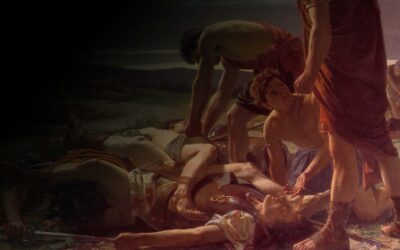Contents
Introduction
The intelligence and kindness of dolphins have amazed and bemused people throughout the ages. Today, in our Latin video book club, we are reading a letter from Pliny the Younger with a special dolphin story.
Pliny the Younger’s original name
In 61 or 62 A.D., a boy called Gaius Caecilius Clio was born in northern Italy. The boy’s father, Lucius Caecilius Clio, died young, and the boy was raised by his mother, Plinia Marcella, with the help of her brother, Pliny the Elder. In his will, Pliny adopted the now teenage boy and left him his entire estate.
This boy, Gaius Caecilius Clio, is known to most as Pliny the Younger or Plinius Minor; he changed his name and added his uncle’s name resulting in Gaius Plinius Caecilius Secundus.
Pliny the Younger’s career is well documented: He studied in Rome, entered the legal profession, joined the military, and then entered the senate. He became a quaestor, then a tribune, a praetor, a prefect, consul, pro-praetor, augur, superintendent, and last but not least, an imperial governor of Bithynia and Pontus.
It is, however, not his illustrious career that has secured him a place in history; it is rather his writing. Pliny the Younger wrote poetry, speeches, and, lastly, letters.
And, it is the letters that have made him famous. We have 247 of Pliny’s letters, written to friends, acquaintances, and associates. Among his correspondents, we find the emperor Trajan and the historians Tacitus and Suetonius. However, and it is important to remember this: the letters were published. This means that before they were published, they were revised and edited. So, even though they provide unique insight into Roman life, keep in mind that they were meant to be read widely. Pliny writes for an audience, not for the sole eyes of a confidant or a pen pal.
The Letter
Today we will read a letter addressed to his friend Caninius Rufus (Plin. Ep IX.33).
In this letter, Pliny tells a dolphin story that he seems to suggest that Caninius use as inspiration for a poem. Caninius wrote poetry in Greek, though nothing of his has survived history. So, we will never know if he ever used Pliny’s dolphin story.
Pliny admits that the dolphin story is not “his”, however, but that he heard it over dinner when stories were told.
Two versions of the Story of the Dolphin
Interesting to say is that Pliny doesn’t mention that his uncle, Pliny the Elder, wrote about the same dolphin story in his Natural History (Nat. 9.8.26)
(There is an interesting article discussing Pliny the Younger’s more artful version of the story than his uncle’s if you are interested: Stevens, Benjamin, “Pliny and the Dolphin – or a Story About Storytelling.”
Video in Latin
Watch and listen to Daniel Pettersson reading the letter in Latin.
Audio only
Latin text (Pl. Ep IX. 33)
C. PLĪNIUS CANĪNIŌ SUŌ S.
1 Incidī in māteriam vēram sed simillimam fictae, dignamque istō laetissimō altissimō plānēque poēticō ingeniō; incidī autem, dum super cēnam varia mīrācula hinc inde referuntur. Magna auctōrī fidēs: tametsī quid poētae cum fide? Is tamen auctor, cui bene vel historiam scrīptūrus crēdidissēs.
2 Est in Āfricā Hippōnēnsis colōnia marī proxima. Adiacet nāvigābile stāgnum; ex hōc in modum flūminis aestuārium ēmergit, quod vice alternā, prout aestus aut repressit aut impulit, nunc īnfertur marī, nunc redditur stāgnō. 3 Omnis hīc aetās piscandī nāvigandī atque etiam natandī studiō tenētur, maximē puerī, quōs ōtium lūsusque sollicitat. Hīs glōria et virtūs altissimē prōvehī: victor ille, quī longissimē ut lītus ita simul natantēs relīquit.
4 Hōc certāmine puer quīdam audentior cēterīs in ulteriōra tendēbat. Delphīnus occurrit, et nunc praecēdere puerum nunc sequī nunc circumīre, postrēmō subīre dēpōnere iterum subīre, trepidantemque perferre prīmum in altum, mox flectit ad lītus, redditque terrae et aequālibus. 5 Serpit per colōniam fāma; concurrere omnēs, ipsum puerum tamquam mīrāculum aspicere, interrogāre audīre nārrāre. Posterō diē obsident lītus, prōspectant mare et sī quid est marī simile. Natant puerī, inter hōs ille, sed cautius. Delphīnus rūrsus ad tempus, rūrsus ad puerum. Fugit ille cum cēterīs. Delphīnus, quasi invītet et revocet, exsilit mergitur, variōsque orbēs implicat expeditque.
6 Hoc alterō diē, hoc tertiō, hoc plūribus, dōnec hominēs innūtrītōs marī subīret timendī pudor. Accēdunt et allūdunt et appellant, tangunt etiam pertrectantque praebentem. Crēscit audācia experīmentō. Maximē puer, quī prīmus expertus est, adnatat nantī, īnsilit tergō, fertur referturque, agnōscī sē amārī putat, amat ipse; neuter timet, neuter timētur; huius fīdūcia, mānsuētūdō illīus augētur. 7 Nec nōn aliī puerī dextrā laevāque simul eunt hortantēs monentēsque. Ībat ūnā — id quoque mīrum — delphīnus alius, tantum spectātor et comes. Nihil enim simile aut faciēbat aut patiēbātur, sed alterum illum dūcēbat redūcēbat, ut puerum cēterī puerī. 8 Incrēdibile, tam vērum tamen quam priōra, delphīnum gestātōrem collūsōremque puerōrum in terram quoque extrahī solitum, harēnīsque siccātum, ubi incaluisset in mare revolvī.
9 Cōnstat Octāvium Avītum, lēgātum prōcōnsulis, in lītus ēductō religiōne prāvā superfūdisse unguentum, cuius illum novitātem odōremque in altum refūgisse, nec nisi post multōs diēs vīsum languidum et maestum, mox redditīs vīribus priōrem lascīviam et solita ministeria repetīsse.
10 Cōnfluēbant omnēs ad spectāculum magistrātūs, quōrum adventū et morā modica rēs pūblica novīs sūmptibus atterēbātur. Postrēmō locus ipse quiētem suam sēcrētumque perdēbat: placuit occultē interficī, ad quod coībātur. 11 Haec tū quā miserātiōne, quā cōpiā dēflēbis ōrnābis attollēs! Quamquam nōn est opus affingās aliquid aut astruās; sufficit nē ea quae sunt vēra minuantur. Valē.Join our Newsletter because we send out tips, updates and learning material.
English Translation
To Caninius.
I have come upon a true story — though it sounds very like a fable — which is quite worthy of engaging the attention of a mind so happy, so lofty, and so poetical as yours, and I came across it at the dinner-table, while the guests were telling various marvellous tales. The author is a man you can implicitly credit, though what has a poet to do with fact? Yet I can assure you that the narrator was one whom you would have trusted, even if you were going to write history.
There is in Africa a colony called Hippo, quite close to the sea, while hard by is a navigable expanse of water, out of which flows a channel like a river, which, according ns the tide is either ebbing or flowing, is carried into the sea or borne back into the stagnant sheet of water. In this place the people of all ages are devoted to fishing, sailing, and swimming, especially the boys, who are tempted thereto by having nothing to do, and by their love of play. They think it a fine thing to show their pluck by swimming out as far as possible, and he is looked upon as the champion who swims the longest way out and leaves the shore and those who are swimming with him farthest behind. While engaged in one of these contests a certain boy, more daring than the rest, kept swimming on and on. A dolphin met him, and first swam in front of the boy, then behind him, then round him, then came up beneath to carry him, put him off, and again came under him, and carried the lad, who was much afraid, first to the open sea, and then, turning to the shore, restored him to dry land and to his playmates. The story spread through the colony, and every one flocked to the spot to gaze upon the lad, as though he were a marvel, to ask him questions, hear the tale, and tell it over again.
On the following day they crowded to the shore, and scanned the sea and the sheet of water. The boys began to swim, and among them was the hero of the adventure, but he showed less daring than before. Again the dolphin returned at the same time and approached the boy, but he fled with the rest. As though inviting him to approach, and calling him to return, the dolphin leaped out of the sea, then dived and twisted and turned itself into various shapes. This was repeated on the next day, and the day after, and on subsequent days, until the men, who had been bred to the sea, began to be ashamed of being afraid. They approached the dolphin, played with him, and gave him a name, and, when he offered himself to their touch, they stroked and handled him. Their boldness grew as they got to know him. In particular, the boy who was the hero of the first adventure with him, leaped on his back as he swam about, and was carried out to sea and brought back again, the boy thinking that the dolphin recognised and was fond of him, while he too grew attached to the dolphin. Neither showed fear of the other, and thereby the boy grew bolder, and the dolphin still more tame. Moreover, other boys swam with them on the right hand and on the left, urging and encouraging them on, and, curiously enough, another dolphin accompanied the first one, but only as a spectator of the fun, and for company’s sake, for he did not follow the other dolphin’s example, and would not allow anyone to touch him, but merely led the way for its companion out to sea, and back again, as the boy’s playmates did for him.
It is almost incredible, but yet every bit as true as the details just given, that the dolphin which thus carried the lad on his back and played with the boys, used to make his way up from the sea on to dry land, and, after drying himself on the sand and getting warm with the heat of the sun, would roll back again into the sea. It is well known too that Octavius Avitus, the proconsular legate, moved by some absurd superstition, poured a quantity of perfume upon the dolphin as he lay on the shore, and that the fish lied fur refuge from this novel treatment and the smell of the perfume out to the deep sea, and only appeared again at the end of several days, in a limp and melancholy condition. Afterwards, however, it recovered its strength, and resumed its former playfulness and attendance upon the boy. All the magistrates flocked to see the sight, and, as they came and stayed, the finances of the little state were seriously embarrassed by its new expenses, while the place itself began to lose its peaceful and tranquil character. So it was decided to put to death secretly the object which drew the people thither.
I can imagine how you will regret this sad ending, how eloquently you will bewail it, and adorn and magnify the tale. Yet there is no need to add a single fictitious incident, or work it up ; all it requires is that none of the true details shall be omitted. Farewell.
Translated by J.B.Firth (1900).
















